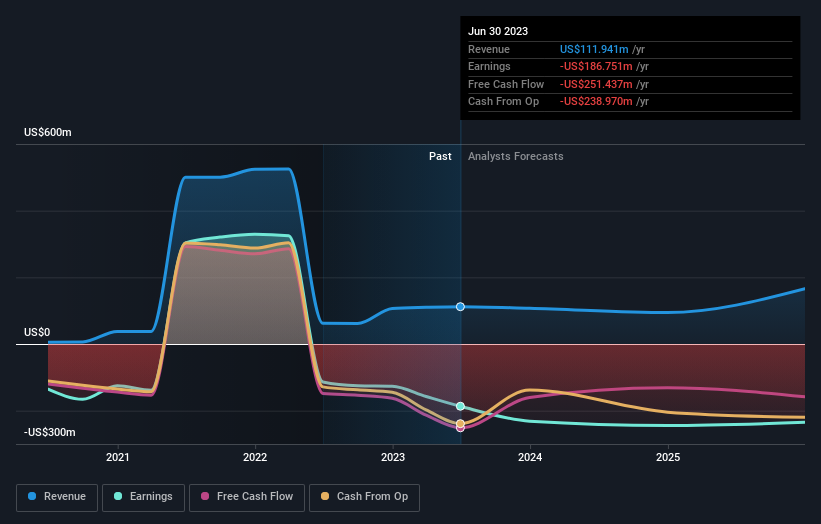Analysts Are More Bearish On uniQure N.V. (NASDAQ:QURE) Than They Used To Be
The latest analyst coverage could presage a bad day for uniQure N.V. (NASDAQ:QURE), with the analysts making across-the-board cuts to their statutory estimates that might leave shareholders a little shell-shocked. Revenue and earnings per share (EPS) forecasts were both revised downwards, with analysts seeing grey clouds on the horizon.
Following the latest downgrade, the current consensus, from the 16 analysts covering uniQure, is for revenues of US$107m in 2023, which would reflect a perceptible 4.1% reduction in uniQure's sales over the past 12 months. Per-share losses are expected to see a sharp uptick, reaching US$4.34. However, before this estimates update, the consensus had been expecting revenues of US$238m and US$1.29 per share in losses. Ergo, there's been a clear change in sentiment, with the analysts administering a notable cut to this year's revenue estimates, while at the same time increasing their loss per share forecasts.
Check out our latest analysis for uniQure
The consensus price target fell 15% to €35.95, implicitly signalling that lower earnings per share are a leading indicator for uniQure's valuation. That's not the only conclusion we can draw from this data however, as some investors also like to consider the spread in estimates when evaluating analyst price targets. Currently, the most bullish analyst values uniQure at €55.88 per share, while the most bearish prices it at €13.97. With such a wide range in price targets, the analysts are almost certainly betting on widely diverse outcomes for the underlying business. With this in mind, we wouldn't rely too heavily on the consensus price target, as it is just an average and analysts clearly have some deeply divergent views on the business.
Looking at the bigger picture now, one of the ways we can make sense of these forecasts is to see how they measure up against both past performance and industry growth estimates. We would highlight that sales are expected to reverse, with a forecast 8.0% annualised revenue decline to the end of 2023. That is a notable change from historical growth of 43% over the last five years. Compare this with our data, which suggests that other companies in the same industry are, in aggregate, expected to see their revenue grow 15% per year. It's pretty clear that uniQure's revenues are expected to perform substantially worse than the wider industry.
The Bottom Line
The most important thing to note from this downgrade is that the consensus increased its forecast losses this year, suggesting all may not be well at uniQure. Regrettably, they also downgraded their revenue estimates, and the latest forecasts imply the business will grow sales slower than the wider market. With a serious cut to this year's expectations and a falling price target, we wouldn't be surprised if investors were becoming wary of uniQure.
Still, the long-term prospects of the business are much more relevant than next year's earnings. We have estimates - from multiple uniQure analysts - going out to 2025, and you can see them free on our platform here.
Of course, seeing company management invest large sums of money in a stock can be just as useful as knowing whether analysts are downgrading their estimates. So you may also wish to search this free list of stocks that insiders are buying.
Have feedback on this article? Concerned about the content? Get in touch with us directly. Alternatively, email editorial-team (at) simplywallst.com.
This article by Simply Wall St is general in nature. We provide commentary based on historical data and analyst forecasts only using an unbiased methodology and our articles are not intended to be financial advice. It does not constitute a recommendation to buy or sell any stock, and does not take account of your objectives, or your financial situation. We aim to bring you long-term focused analysis driven by fundamental data. Note that our analysis may not factor in the latest price-sensitive company announcements or qualitative material. Simply Wall St has no position in any stocks mentioned.

